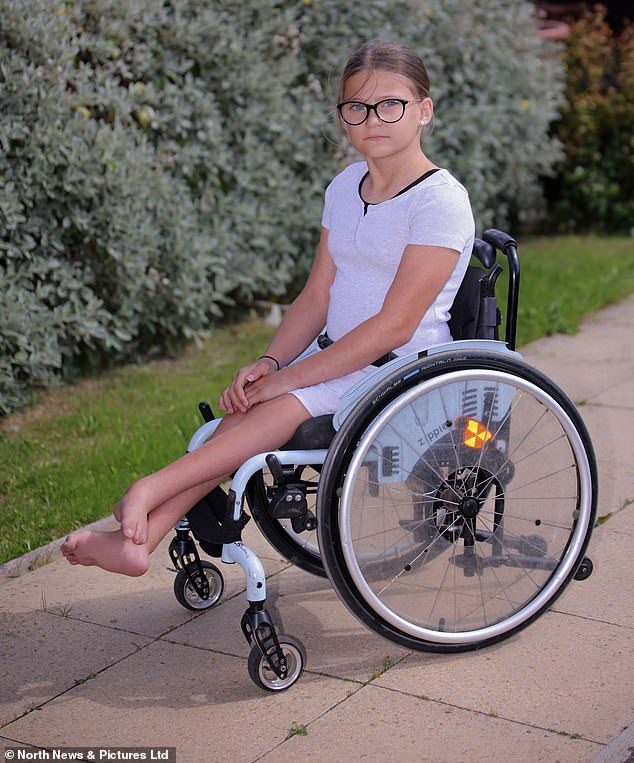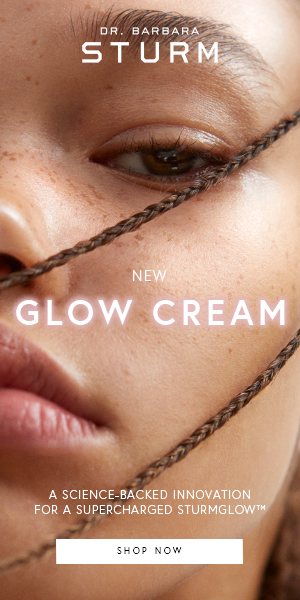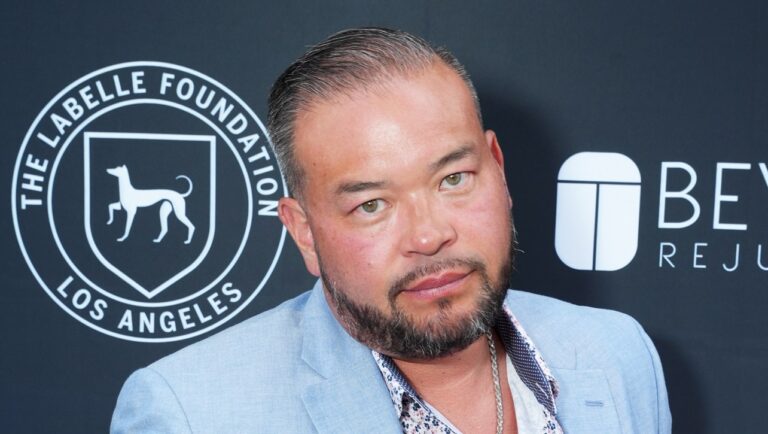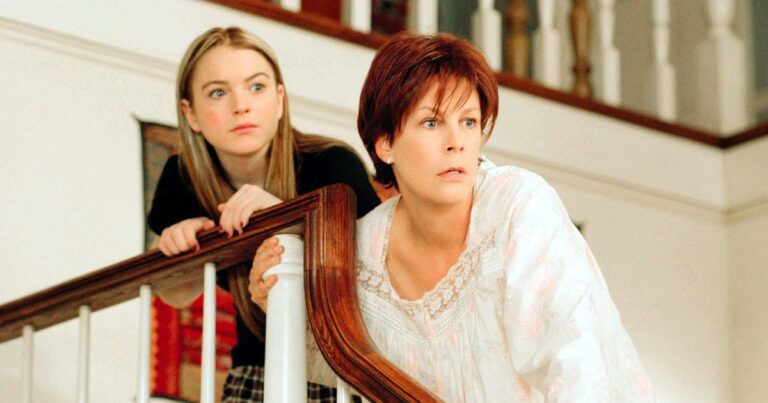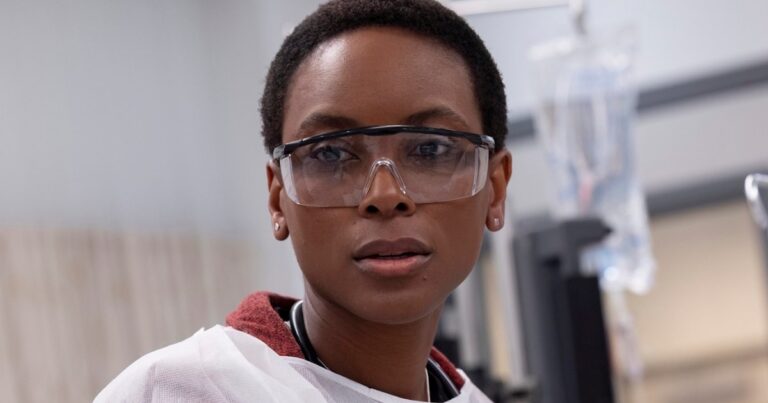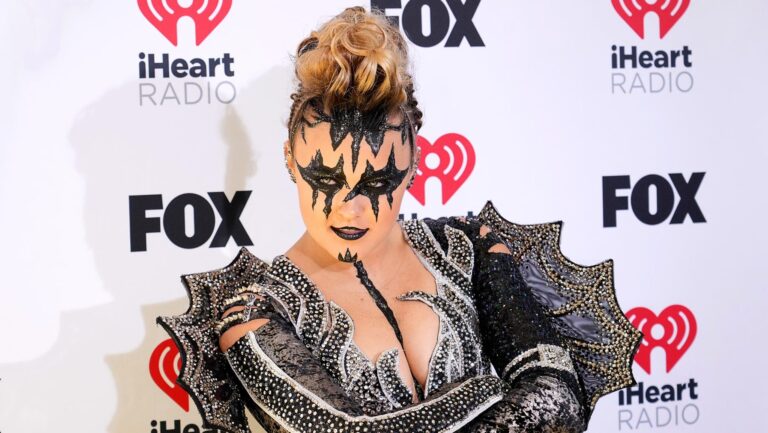A young girl from Sunderland was left devastated when she was forbidden from playing on a bouncy castle at a party on account of her disability.
Rubie O’Brien who has spina bifida – a condition that affects the spine and, in some cases, makes walking impossible – was left with no choice but to sit with the adults when she was banned from using the Mario Cart-themed inflatable at her cousin’s party.
The 11-year-old wheelchair user’s mother,Ciara Heffernan, claimed her partner was told by a male staff member there were fears Rubie, who was jumping up and down on her bottom, would damage the bouncy castle and had to come off.
Ciara,a 34-year-old carer, who always taught Rubie there’s no such thing as ‘you can’t’, was forced to break the heartbreaking news to her daughter.
Angered by the fact that her little girl was being excluded, she has since hit out at the events company, Elite Entertainments, which helped run the party.
The mother said: ‘I had to tell Rubie she wasn’t allowed on and she was really disappointed.
‘She was very disheartened and she came and sat by the table with us, which was awful.’
Ciara added that Rubie had never previously been prevented from playing on a bouncy castle.

Rubie O’Brien (pictured), who has spina bifida – a condition that affects the spine and, in some cases, makes walking impossible, was left disheartened after she was forbidden from playing on a bouncy castle

Rubie, pictured with her motherCiara Heffernan, was banned from using the bouncy castle at her cousin’s party on account of her disability
‘I was so shocked,’ the mother said, adding, ‘In this day and age it shouldn’t be happening.’
She continued: ‘I was genuinely absolutely gutted for her. She was excluded from taking part.’
The party, in South Shields, South Tyneside, was held for Rubie’s cousin, and included the Mario Cart-themed bouncy castle which came with an enclosed entrance.
But despite initially playing on it without issue, Ciara’s sister was told Rubie would have to come off for health and safety reasons.
When Rubie’s stepfather queried this verdict, he said a male worker informed him that the little girl risked damaging the equipment.
Ciara said: ‘Rubie was dancing inside the bouncy castle because there was a disco ball.
‘She was wiggling her hips and the male worker mimicked that action and told my partner she could have damaged the equipment.
‘This child has done all kinds of things so a bouncy castle is one thing I never thought I’d have an issue with.’

Rubie, who was jumping up and down on her bottom, was reportedly asked to get off the bouncy castle (pictured) due to fears that she might damage it

Ciara has always told her daughter that there’s no such thing as ‘you can’t’ and was angered by the fact Rubie was being excluded
The company said there were too many children at the party to play all at once and insisted they followed health and safety protocols.
But Ciara added: ‘All I want for her is inclusion and equal opportunities and there was none of that.
‘If there were too many kids on the bouncy castle at once that’s fine, but Rubie was the only one not allowed on.
‘I taught her from a young age there’s no such thing as “you can’t” but this takes away what I instilled in her.
‘I would never kick up a fuss if it was genuine health and safety reasons but that wasn’t the reason they gave to my partner.’
Julie Nelson, from Elite Entertainments, said: ‘We have been in the business for many, many years and children’s safety is paramount.
‘What my colleague said was picked up completely wrong. He said if we had known about Rubie we could have brought an alternative castle which was larger to prevent any injuries.
‘At this particular party we had 36 children turn up when we normally only cater for around 25.

Rubie has never previously been told that she can’t play on a bouncy castle, her mother claimed

The little girl was left with no choice but to sit with the adults at her cousin’s party, held inSouth Shields
‘Because the little girl was lying on the bouncy castle, all it would have taken was someone to land on her and an injury would have occurred.
‘I rang the manufacturer twice after the party and they told me we had done the right thing.
‘It is upsetting for both parties but had there been an accident it would have been ten times worse.
‘At no point during the party was the little girl sat on her own.’
WHAT IS SPINA BIFIDA?
Spina bifida is a relatively common birth defect, affecting about 1,500 to 2,000 babies born in the US each year and around 700 in the UK annually.
Babies born with spina bifida have improperly formed spines and spinal cords.
During development these structures – along with the brain – all arise out of something called a neural tube, a precursor the entire central nervous system as well as the protective tissues that form around them.
Typically, this tube forms and closes by the 28th week of pregnancy.
But in babies with spina bifida, it doesn’t close properly, for reasons that are not entirely clear yet to scientists.
Instead, these babies are left with a gap in the vertebrae, through which part of the spinal cord may slip, depending the severity.
People with the mildest form of spina bifida – the occulta form – may not even know they have it.
The gap between their vertebrae is so small that the spinal cord stays in place and they are unlikely to experience any kind of neurological or motor symptoms.
In the next more severe form of the condition, called meningocele, the the protective fluid and membranes around the spinal cord are pulled through a gap into a fluid filled sack on the exterior of the baby’s back.
There’s no actual nervous tissue out of place, so there may be complications, but they’re less likely to be life altering.
But in open spina bifida, or myelomeningocele, there are larger or multiple openings along the spine.
Both the membranes and spinal nerves and tissues they’re meant to protect are pulled outside the baby at birth.
The symptoms vary wildly based on where and how severe these openings are.
Some children may develop little more than skin problems, while other with severe forms may be unable to walk or move properly, or develop infections like meningitis that can leave them with permanent brain damage.
Making sure women get plenty of folic acid in pregnancy can help ensure the spinal cord develops properly.
After birth, surgery to repair these openings may be performed and, in more recent years, some surgeons have begun repairing spina bifida in the womb.


